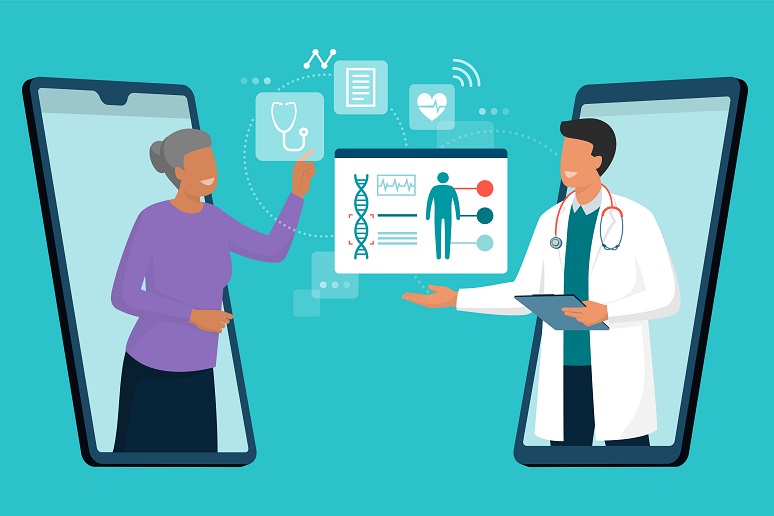Senior citizens tend not to be the savviest of users, but they’re often the people who can most benefit from a high-tech touch when it comes to health care — especially when a contagious disease restricts their ability to get out and about. But what’s the best way of delivering virtual services to the elderly?
Arkos Health, a technology-based care provider formed from the
July merger of health-care specialists Curavi Health, CarePointe, and U.S. Health Systems, has entrusted itself with finding the answer. Arkos brings together a robust data aggregation framework with a medical services organization “so that we can put deals together and put our money where our mouth is to manage risk on behalf of health plans, along with virtual services,” explained Aaron Duerksen, executive vice president of Arkos, in a recent No Jitter briefing.
For example, Arkos provides mobile carts operated by technicians to support telemedicine visits between geriatricians and seniors living in skilled nursing facilities — saving the risk of exposure to COVID-19 and other diseases for the physicians and patients alike. “We're using all these technologies to help us get as much information as possible on the patient, contextualize that information, and be able to deliver services to the senior,” he said.
In its work, Arkos combines hospital, primary care, nursing home, and other medical data with claims data — i.e., payment history — for individuals. Aggregating and analyzing the data allows Arkos to divide the population by risk, both historical and emerging, to determine which seniors are most likely in need of its services, Duerksen said.
Now Arkos is looking to extend its virtual care offerings outside of the skilled nursing facility, Duerksen said. It intends to do by putting “health care in seniors’ hands with an application that will run on a smartphone, but have the undercarriage of a very robust communications system,” Duerksen said.
As
announced last month, Arkos will be enabling this via a mobile engagement layer it will create using Braidio WorkStreams low-code/no-code mobile app-building platform, powered by voice, messaging, chat, and video capabilities available within the AT&T API Marketplace. “We really look at our partnership with Braidio as that virtual last mile of care, so that we can engage our members before we have to deploy a physical person, like a nurse practitioner or registered nurse, to the home,” he added.
In its initial deployment, the mobile app will support the ability to chat and click to call into its contact center, on the Five9 cloud platform, so seniors can receive help in scheduling an appointment or getting questions answered, Duerksen said. As of our conversation in late October, Arkos had finished the data integration and had put out the UI and user experience in a test environment, with plans to launch across roughly 10,000 Medicare Advantage members, he said.
“There’s a lot of handholding … and we’re learning together, in terms of how we assist the seniors. And that learning allows us to get better at deploying and implementing mobile applications,” Duerksen said.
Ultimately, he added, Arkos wants to transform the way consumers use technology for health care. To date, consumerization efforts have been sporadic, spotty, and full of potholes. It’s early days, though, he said. “We’re still in the beginning stages of consumerizing health care, to be able to provide a very robust personal health record on your smartphone and then integrate that information with intelligence on what you may need, and how to access — and that’s really the confluence what we’re trying to do at Arkos, to be that facilitator of information and services.”
COVID-19, however, has removed one of the biggest stumbling blocks — status quo, Duerksen said. “COVID really accelerated the need to think about how to deliver care differently, and that’s a good thing.”










